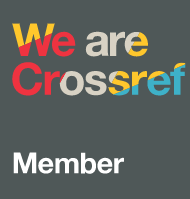Theory and practice of constructive approaches in mathematics learning
Abstract
The purpose of this study is to examine the theory and practice of constructivism in learning mathematics. This research is qualitative research using library research methods. Data was obtained by collecting various literature sources such as books, journals, and online research articles that are appropriate to the research problem. Data analysis in this study was carried out by content analysis. The research results show that teachers need to give students the freedom to experiment and provide relevant contexts for their theory development. In practice, teachers must consider that each student is unique and different in the way they understand and construct their knowledge. Therefore, teachers need to facilitate the learning process by considering the individual differences of students, ensuring that they have useful experiences and gain a deep understanding of the topics being taught.
Keywords
Full Text:
PDFReferences
Agustyaningrum, N., & Pradanti, P. (2022). Teori Perkembangan Piaget dan Vygotsky: Bagaimana Implikasinya dalam Pembelajaran Matematika Sekolah Dasar?. Jurnal Absis: Jurnal Pendidikan Matematika Dan Matematika, 5(1), 568-582.
Ali, H. H., & Jameel, H. T. (2016). Causes of poor performance in mathematics from teachers, parents and student’s perspective. American Scientific Research Journal for Engineering, Technology, and Sciences(ASRJETS), 15(1), 122-136.
Amineh, R. J., & Asl, H. D. (2015). Review of constructivism and social constructivism. Journal of Social Sciences, Literature and Languages, 1(1), 9–16.
Bielaczyc, K., & Collins, A. (1999). Learning communities in classrooms: A reconceptualization of educational practice. In C. Reigeluth (Ed.), Instructional design theories and models: A new paradigm of instructional theory (vol. 2) (pp. 269-292). Mahwah, NJ: Lawrence Erlbaum Associates, Inc.
Beerenwinkel, A., & von Arx, M. (2017). Constructivism in practice: An exploratory study of teaching patterns and student motivation in physics classrooms in Finland, Germany and Switzerland. Research in Science Education, 47(2), 237–255.
Belbase, S. (2011). Radical versus social constructivism: Dilemma, dialogue, and defense. Online available from: http://files.eric.ed.gov/fulltext/ED525159.pdf
Bettencourt, A. (1989). What Is Constructivism and Why Are They All Talking About It?.
Christie, A. (2005). Constructivism and its implications for educators. Online available from the World Wide Web: http://alicechristie.com/edtech/learning/constructivism/index.htm
Cooperstein, S. E., & Kocevar-Weidinger, E. (2004). Beyond active learning: A constructivist approach.Reference Services Review, 32(2), 141-148. Online available in the following World Wide Web: http://www.unc.edu/~bwilder/inls111/111beyondactivelearningWED.pdf
Ernest, P. (1991). The philosophy of mathematics education. London, U. K.: Falmer.
Ernest, P. (1995). The one and the many. In L. P. Steffe & J. Gale (Eds.), Constructivism in education (pp. 459–486). Hillsdale, NJ: Lawrence Erlbaum.
Ernest, P. (1998). Social constructivism as a philosophy of mathematics. New York, NY: State University ofNew York Press.
Ernest, P. (2010). Reflections on theories of learning. In B. Sriraman & L. English (Eds.), Theories of mathematics education: Seeking new frontiers (pp. 39-47). New York, NY: Springer. DOI:10.1007/978-3-642-00742-2_4
Ernest, P. (1999). Social constructivism as a philosophy of mathematics: Radical constructivism rehabilitated. Online available from: http://people.exeter.ac.uk/PErnest/soccon.htm
Ginting, M. B. (2018). Membangun Pengetahuan Anak Usia Dini Melalui Permainan Konstruktif Berdasarkan Perspektif Teori Piaget. Jurnal Caksana: Pendidikan Anak Usia Dini, 1(02).
Glasersfeld, E. Von. (1987). Construction of Knowledge. Inter-systems Publications, Salians, CA.
Gordon, M. (2009). Toward a pragmatic discourse of constructivism: Reflections on lessons from practice. Educational Studies, 45(1), 39–58.
Hashim, M., & Noh, M. (2013). Konstruktivisme: dari Kaca Mata Guru Sains Dan Matematik. The International Conference On Social Sciences, 4-5 Okt 2013, Izmir,turki.
Hein, G.E. (1991). Constructivist Learning Theory. International Committee of Museum Educators). Jerusalem-Israel.
Huang, H. (2002). Toward constructivism for adult learners in online learning environments. British Journal of Educational Technology, 33(1), 27–37.
Hoover WA. (1996). The practice implications of constructivism. SEDL Letter, 9(3), 1-2.
Huda, N., & Kencana, A. G. (2013). Analisis kesulitan siswa berdasarkan kemampuan pemahaman dalam menyelesaikan soal cerita pada materi kubus dan balok di kelas VIII SMP Negeri 30 Muaro Jambi. Prosiding Semirata 2013, 1(1).
Istiadah, F. N. (2020). Teori-teori belajar dalam pendidikan. edu Publisher.
Kaufman, D. (1996). Constructivist-based experiential learning in teacher education. Action in Teacher Education, 18(2), 40–50.
Koohang, A., Riley, L., Smith, T., & Schreurs, J. (2009). E-learning and constructivism: From theory to application. Interdisciplinary Journal of E-Learning and Learning Objects, 5(1), 91–109.
Langoban, M. A. (2020). What makes mathematics difficult as a subject for most students in higher education? International Journal of English and Education, 9(3), 214—220.
Leo, C. (1990). Reflexive thinking in mathematics: Formal and informal aspects. In A. Diez, J. Echeverria, A.Ibarra (Eds.), Structures in mathematical theories (383-389). San Sebastian International Symposium. Online available from: http://www.tau.ac.il/~corry/publications/articles/pdf/reflexive.pdf
Masgumelar, N. K., & Mustafa, P. S. (2021). Teori Belajar Konstruktivisme dan Implikasinya dalam Pendidikan dan Pembelajaran. GHAITSA: Islamic Education Journal, 2(1), 49–57.
Miranda, J., Navarrete, C., Noguez, J., Molina-Espinosa, J.-M., Ramírez-Montoya, M.-S., Navarro-Tuch, S. A., Bustamante-Bello, M.-R., Rosas-Fernández, J.-B., & Molina, A. (2021). The core components of education 4.0 in higher education: Three case studies in engineering education. Computers & Electrical Engineering, 93, 107278.
Murphy, K. L., Mahoney, S. E., Chen, C., Mendoza‐Diaz, N. V, & Yang, X. (2005). A constructivist model of mentoring, coaching, and facilitating online discussions. Distance Education, 26(3), 341–366.
Nursikin, M. (2016). Aliran-Aliran Filsafat Pendidikan Dan Implementasinya Dalam Pengembangan Kurikulum Pendidikan Islam. ATTARBIYAH: Journal of Islamic Culture and Education, 1(2), 303–334.
Rahim, R., Gumelar, G. R., Chabibah, N., Ritonga, M. W., Musyadad, V. F., Komalasari, D.,& Haris, A. (2021). Pendekatan pembelajaran guru. Yayasan Kita Menulis.
Rusman. (2017). Belajar & Pembelajaran: Berorientasi Standar Proses Pendidikan. Prenada Media
Sa’ad, T. U., Adamu, A., & Sadiq, A. M. (2014). The causes of poor performance in mathematics among public senior secondary school students in Azare metropolis of Bauchi State, Nigeria. Journal of Research & Method in Education, 4(6), 32
Sari, M., & Asmendri, A. (2020). Penelitian kepustakaan (library research) dalam penelitian pendidikan IPA. Natural Science: Jurnal Penelitian Bidang IPA Dan Pendidikan IPA, 6(1), 41-53.
Shapiro. (1994). What Children Bring to Light: A Constructivist Perspective on Childeren’s Learning in Science. Ny: Teachers Colege Press.
Soviawati, E. (2011). Pendekatan matematika realistik (pmr) untuk meningkatkan kemampuan berfikir siswa di tingkat sekolah dasar. Jurnal Edisi Khusus, 2(2), 79-85.
Steffe, L. P., & Kieren, T. (1994). Radical constructivism and mathematics education. Journal for Research in Mathematics Education, 25(6), 711-733
Sugrah, N. (2019). Implementasi teori belajar konstruktivisme dalam pembelajaran sains. Humanika, Kajian Ilmiah Mata Kuliah Umum, 19(2), 121-138.
Suparlan, S. (2019). Teori konstruktivisme dalam pembelajaran. Islamika, 1(2), 79–88.
Umbara, U. (2017). Psikologi Pembelajaran Matematika (melaksanakan pembelajaran matematika berdasarkan tinjauan psikologi). Deepublish.
Von Glasersfeld, E. (2001). Constructivism in education. In T. Husen & T. N. Postlethwaite (Eds.), The international encyclopedia of education: Research and studies (pp. 162-163). Supplementary Volume 1. Oxford, U. K.: Pergamon Press.
Von Glasersfeld, E. (1995). Questions and answers about radical constructivism. In M.K. Pearsall (Ed.), Scope, sequence, and coordination of secondary school science, Vol. II: Relevant research, (pp. 169-182). Washington, D.C.: The National Science Teachers Association.
Vygotsky, L. S. (1978). Mind in society: The development of higher psychological processes. Cambridge, MA: Harvard University Press.
Waston, W. (2014). Epistemologi Konstruktivisme dan Pengaruhnya terhadap Proses Belajarmengajar di Perguruan Tinggi.
Wibowo, H. (2020). Pengantar Teori-teori belajar dan Model-model pembelajaran. Puri Cipta Media.
Wilding-Martin, E. C. (2011). Paul Ernest’s social constructivist philosophy of mathematics education. ProQuest, UMI Dissertation Publishing.
Wuketits, F. M. (1984). Evolutionary epistemology: A challenge to science and philosophy. In F. M. Wuketits (Ed.), Concepts and approaches in evolutionary epistemology (pp. 1-29). Dordrecht, The Netherlands: Reidel
Yeni, E. M., Wahyudin, & Herman, T. (2020). Difficulty analysis of Elementary School students in mathematical problem solving in solutions. International Journal of Scientific & Technology Research, 9(3), 44-47.
DOI: https://doi.org/10.33373/chypend.v9i1.5127
Refbacks
- There are currently no refbacks.

This work is licensed under a Creative Commons Attribution-NonCommercial-ShareAlike 4.0 International License.
Copyright (c) 2018 Universitas Riau Kepulauan

Ciptaan disebarluaskan di bawah Lisensi Creative Commons Atribusi 4.0 Internasional.















